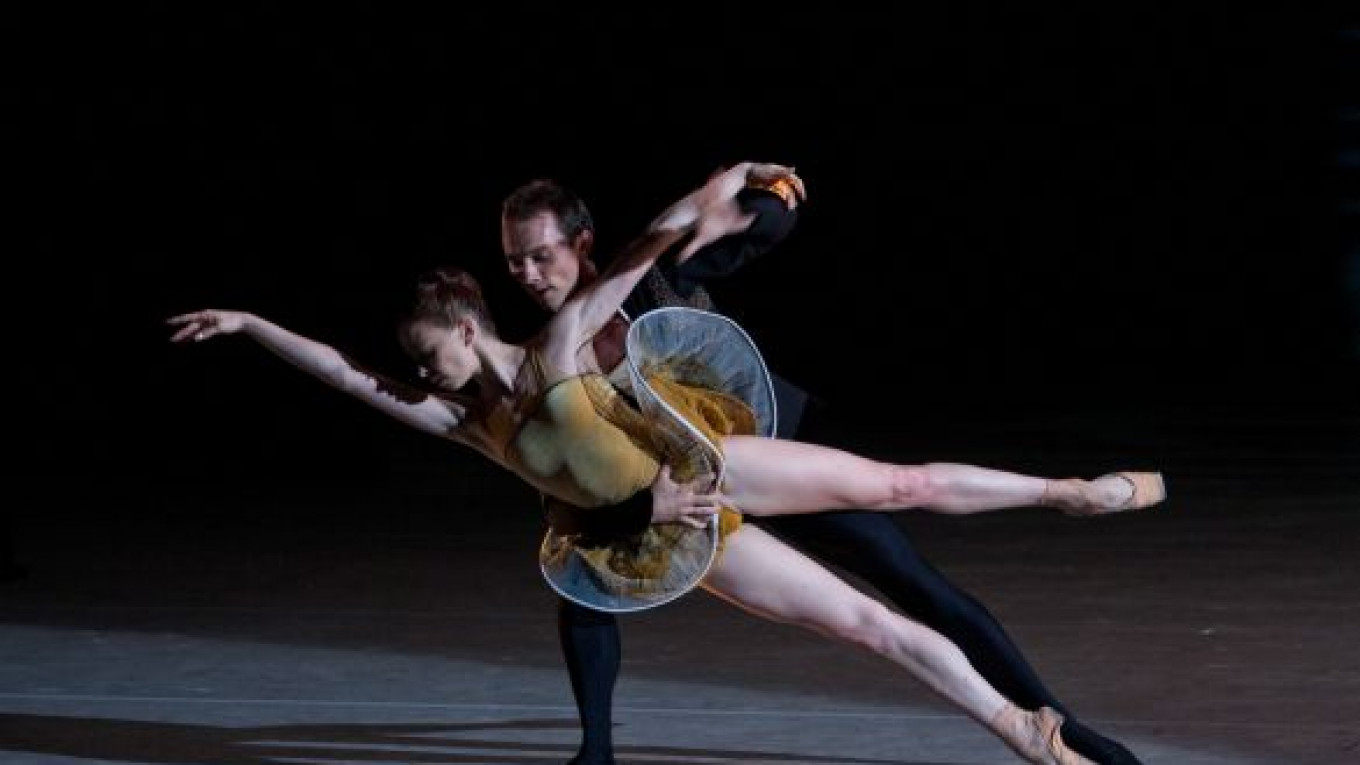The ballet company of the Bolshoi Theater spends the greater part of its time tending the monsters that inhabit its Jurassic Park of 19th-century and Soviet-era ballets. Understandably so, as these are what its public most wants to see and, with a few exceptions, are no doubt worthy of preservation.
But with what seem an ever-growing audience in Moscow for contemporary ballet and a troupe of dancers increasingly adept at mastering its intricacies, it is good to find the Bolshoi giving at least a nod to ballets of the here and now.
At the end of June, the theater brought to its New Stage a two-evening festival of 21st-century ballet, combining appearances by a pair of distinguished foreign companies, the San Francisco Ballet and Les Ballets de Monte-Carlo, with dancing by Bolshoi's own troupe in two new additions to its repertoire. Leaving aside the festival's overly cute title, WWB@LLET.RU, there was much to admire in what it had to offer.
The highpoint of the festival, beyond any doubt, was the Monte Carlo company's production of Maurice Ravel's "Daphnis et Chloe," as choreographed by its enormously gifted artistic director, Jean-Christophe Maillot.
"Daphnis et Chloe" first appeared exactly 100 years ago, as part of Serge Diaghilev's fourth Saison Russe in Paris. It proved less than an outstanding success, and subsequent productions I have seen have led me to believe that Ravel's magical score is probably better off not being danced. Not so, however, in the case of Maillot's version, which casts aside the rather silly story devised by the work's original choreographer, Mikhail Fokin, and delves deeply into Ravel's music to come up with a marvelously erotic tale of a young couple's initiation into love-making, repeatedly thwarted by an older couple of mysterious origin.
Maillot's choreography is entirely of the present-day, concentrating, as the Bolshoi's program puts it, "on movements of the body and the emotional and affective influence of those movements." The four Monte Carlo dancers gave the work a performance of truly phenomenal virtuosity.
The San Francisco Ballet presented two programs, the second of which, on the night I attended, consisted of a finely wrought set of seven dance combinations for eight dancers by the company's long-time artistic director Helgi Tomasson, set to movements from the keyboard concertos of Johann Sebastian Bach, and the balcony scene from Sergei Prokofiev's "Romeo and Juliet," also in Tomasson's choreography and featuring the company's superb Russian-born ballerina Maria Kochetkova.
The San Francisco Ballet was represented as well by its resident choreographer, Yury Posokov, who re-created for the Bolshoi his ballet "Classical Symphony," which he originally staged for his home company two years ago. Posokov is no stranger to Moscow. His career in ballet began at the Bolshoi, where he danced from 1982 until his departure ten years later to join the Royal Danish Ballet and, soon afterward, to become a principal dancer, and eventually choreographer, with the San Francisco Ballet. In 2006, he enjoyed considerable success with a highly imaginative staging for the Bolshoi of Prokofiev's "Cinderella."
"Classical Symphony" also draws on the music of Prokofiev, his light-hearted, 15-minute-long Symphony No. 1. In it, Posokov seemingly seeks to give new meaning to ballet's traditional movements, juxtaposing and distorting them in a variety of unexpected and sometimes quite comical ways. While I found it enjoyable to watch, I only began to appreciate it in retrospect and look forward to taking a more careful look when it returns in the coming season.
Finnish-born Jorma Elo, resident choreographer of the Boston Ballet, presented the Bolshoi with a brand-new work titled "Dream of Dream," set to the music of Sergei Rachmaninov's familiar Piano Concerto No. 2.
According to Elo, the ballet concerns "a girl dreaming of love. … But she, the girl, is always alone, as if cut off from the world by a wall. She is unable to communicate with her friends and they have no wish to be friends with her. … Lying at the basis of 'Dream of Dream' is a social situation, not a story."
I much admired Elo's "Slice to Sharp," which he staged two years ago for the Stanislavsky and Nemirovich-Danchenko Musical Theater. "Dream of Dream" struck me as a work of lesser quality, one in which the choreographer seemed to be striving hard to make a point, but ultimately failing to communicate much of anything at all.
To his credit, Elo produced a number of sequences that were beautifully crafted to display the talents of the five couples portraying the girl's so-called "friends." Choreography for the fragmented role of the girl proved less successful, though Anna Nikulina handled it with aplomb.
"Classical Symphony" (Klassicheskaya Simfoniya) and "Dream of Dream" (no Russian title) next play Oct. 4, 5, 6 and 7. At 7 p.m. Bolshoi Theater New Stage. 1 Teatralnaya Ploshchad. Metro Teatralnaya. Tel. (495) 455-5555.
A Message from The Moscow Times:
Dear readers,
We are facing unprecedented challenges. Russia's Prosecutor General's Office has designated The Moscow Times as an "undesirable" organization, criminalizing our work and putting our staff at risk of prosecution. This follows our earlier unjust labeling as a "foreign agent."
These actions are direct attempts to silence independent journalism in Russia. The authorities claim our work "discredits the decisions of the Russian leadership." We see things differently: we strive to provide accurate, unbiased reporting on Russia.
We, the journalists of The Moscow Times, refuse to be silenced. But to continue our work, we need your help.
Your support, no matter how small, makes a world of difference. If you can, please support us monthly starting from just $2. It's quick to set up, and every contribution makes a significant impact.
By supporting The Moscow Times, you're defending open, independent journalism in the face of repression. Thank you for standing with us.
Remind me later.






